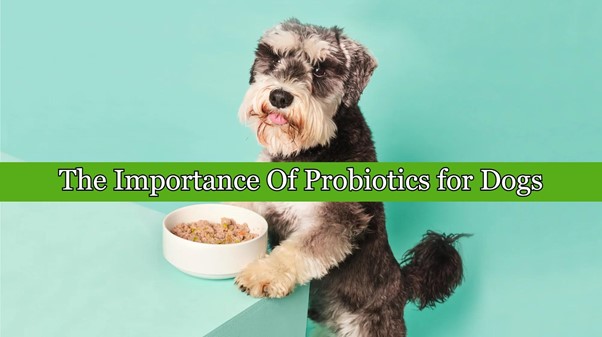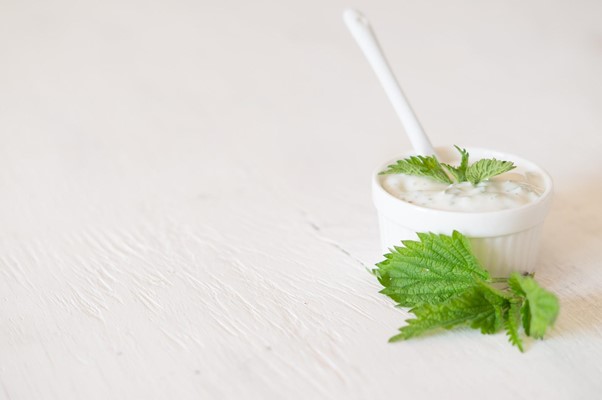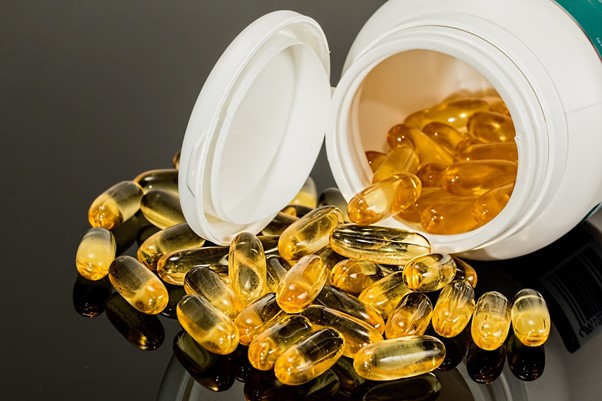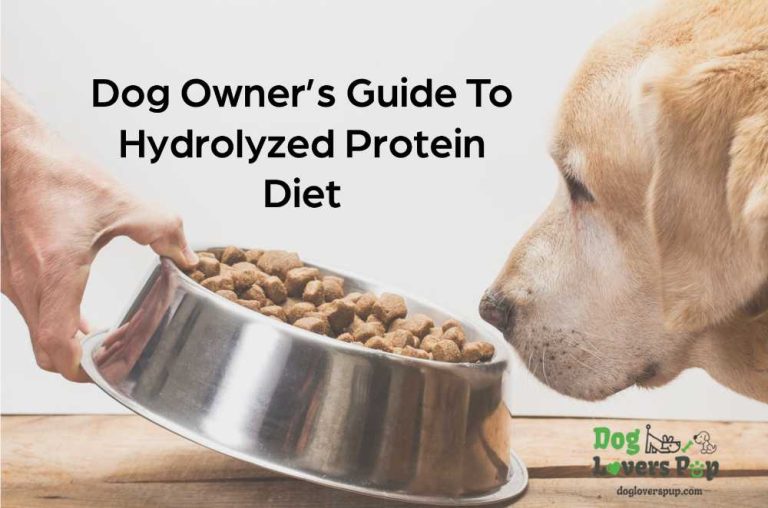Dog Owner’s Guide on Probiotics for Dogs
- Last updated on April 20, 2023
- By: Caroline Stowe
Probiotics are live microorganisms that, when taken in adequate amounts, provide health benefits to the host.
They have long been used as a beneficial supplement for humans, but recently they have become increasingly popular among pet owners looking to improve their dog’s overall health and well-being.
Probiotics can help maintain healthy gut bacteria, support a balanced immune system, and aid in digestion.
While probiotics are generally considered safe for dogs, it is important to understand how they work and what the best sources of them are before adding them to your dog’s diet.

What Are Probiotics?
Probiotics are live microorganisms that help balance the bacteria in your dog’s digestive system.
This is important because if there is an imbalance of bacteria, it can lead to issues like diarrhea, constipation, and other digestive problems.
Probiotics also help support a healthy immune system and can aid in preventing infections from taking hold in your pet’s body.
What Are the Benefits of Feeding Your Dog Probiotics?
Research has shown that probiotics can provide several benefits for dogs, including:
Improved Digestion
Probiotics are beneficial bacteria that help to create balance in the digestive system, which can lead to improved digestion.
This means less gas and bloating, as well as easier stool formation and production.
As a bonus, probiotics support the absorption of essential vitamins and minerals from food, which helps to ensure optimal health for your pup.
Stronger Immune System
The immune system is incredibly important in keeping your pup healthy and strong, and probiotics can aid in this process by protecting against harmful bacteria.
By keeping the gut flora balanced, probiotics help to ward off any potential illnesses or diseases that could result from an unhealthy immune system.
Additionally, they provide essential nutrients to bolster the body’s natural defenses against viruses and infections.
Reduced Allergy Symptoms
If your pup suffers from allergies or sensitivities, then feeding them probiotic-rich foods may help reduce their symptoms.
Probiotics have been shown to decrease inflammation associated with certain allergies by reducing irritation in the gut lining caused by allergens such as pollen and dust mites.
In addition, they stimulate the production of antibodies which can reduce allergy symptoms even further.
Improved Skin Health
Probiotic-rich foods can also help improve skin health due to their anti-inflammatory properties and ability to reduce itching associated with certain skin conditions like eczema or dermatitis.
They also promote healthy levels of oil on the skin which helps keep it hydrated and protected from environmental damage like windburn or sunburn.
Furthermore, they contain essential fatty acids which nourish fur follicles and promote softness in coats and skin texture.

Improved Oral Health
Not only do probiotic-rich foods benefit digestive health but they can also improve oral health too! The beneficial bacteria found in these foods have been known to fight off bad breath-causing bacteria as well as strengthen tooth enamel for a healthier mouth overall.
Furthermore, they provide essential nutrients that promote gum health for a brighter smile with fewer trips to the vet!
How to Choose the Right Probiotics for Your Dog
When it comes to choosing the right probiotic for your pup, there are a few things you should keep in mind.
First and foremost, look at the types of bacteria that are included in each product. Different strains of bacteria have different benefits, so make sure you research which bacteria will help address your pet’s specific needs.
You should also pay attention to how much of each strain is present in each product—the more potent a product is, the better it will be able to treat any potential issues.
Additionally, consider whether or not a product contains prebiotics; these are essential compounds that feed beneficial bacteria and help them thrive within your pup’s gut environment.
Last but not least, make sure the product is made with natural ingredients that won’t upset your dog’s stomach or cause any adverse reactions.
Make sure to read the label carefully and check that it contains live cultures, such as Lactobacillus and Bifidobacteria species. It’s also important to consider your dog’s age and weight when choosing a probiotic.
Some are formulated specifically for puppies or large breeds, while others may be more suitable for adult or senior dogs.
Check out our reviews on some of the top-rated probiotic for dogs here.
Dosage and Administration
Once you’ve chosen a probiotic that’s right for your pup, you’ll need to determine how much and how often they should take it.
This varies depending on their age and size as well as their individual health needs—so consult with your vet before starting any new supplement regimen!
Generally speaking, most products recommend giving one dose per day (or as recommended by a vet).
However, if you’re introducing a new probiotic into their diet or switching from one brand to another, it might be best to start with half doses initially until their body gets used to it.
This will ensure that they don’t experience any adverse side effects such as stomach upset or diarrhea.
The Best Sources of Probiotics for Dogs
There are a variety of sources of probiotics available for dogs. This includes:
Yogurt
Yogurt is one of the most popular sources of probiotics for dogs. It’s easy to find, affordable, and packed with beneficial bacteria that help keep your pup’s digestive system functioning properly.

Just make sure to look for plain yogurt without added sugar or sweeteners.
Kefir
Kefir is a fermented dairy product similar to yogurt. It contains beneficial bacteria and yeast that help promote good digestion and overall health in dogs.
Fermented Vegetables
Fermented vegetables such as sauerkraut and kimchi are excellent sources of beneficial probiotic bacteria. They also contain important vitamins and minerals that are essential for keeping your pup healthy.
Miso Soup
Miso is a fermented soybean paste that has been used in Japanese cuisine for centuries. It contains beneficial bacteria as well as other nutrients like vitamin B12, zinc, iron, and magnesium which can help support your dog’s immune system.
Pickles
Pickles are an excellent source of probiotics because they contain vinegar which helps encourage the growth of beneficial bacteria in the gut. Just make sure to look for pickles without any added sugar or preservatives – these can be harmful to your pup’s health!
Apple Cider Vinegar
Apple cider vinegar contains acetic acid which helps balance out the pH levels in your pup’s gut, promoting healthy digestion and helping maintain their overall health and well-being.
Fish Oil
Fish oil supplements are rich in omega-3 fatty acids which can help reduce inflammation throughout your pet’s body while also providing them with beneficial probiotic bacteria to support their digestive system function.

Prebiotic Supplements
Prebiotic supplements are formulated specifically for pets and contain special combinations of prebiotic fibers like FOS (Fructooligosaccharides) which help nourish beneficial microorganisms in the gut.
Dairy Products
Dairy products like cheese, cottage cheese, and greek yogurt all contain small amounts of probiotic bacteria that can help support your pet’s digestive system.
Probiotic Supplements
There are many different types of pet probiotic supplements on the market today that provide concentrated doses of beneficial bacteria to support digestive health.
Tips to Help Keep Your Dog’s Gut Health in Balance With Probiotics
Choose Quality Supplements
It is important to make sure you purchase a quality probiotic supplement for your pup.
Look for one that contains a wide variety of beneficial bacteria strains and that is specifically designed for dogs.
Also, check the ingredient list for any allergens or fillers that could cause an upset stomach.
Give it Regularly
For best results, give your dog their probiotic supplement regularly as directed by the manufacturer.
This will help ensure they have enough good bacteria in their body at all times to keep their digestive system healthy and functioning optimally.
Use Food Sources
Adding food sources of probiotics into your pup’s diet is also beneficial for gut health.
Consider adding yogurt, kefir, miso, kimchi, and other fermented foods into their daily meals on occasion for an extra boost of beneficial bacteria.
Monitor Weight Gain
Probiotic supplements should not be used as a weight gain aid – if your pup begins gaining weight after starting them then consider reducing the dosage or discontinuing use altogether (make sure you speak with your vet first).
Consult Your Vet
Before giving your pup any type of supplement – even one as natural as a probiotic – speak with your vet first to make sure it is right for them and won’t interact negatively with any medications they may be taking.
Ask about which brands they recommend too.
Monitor Digestive Changes
If you notice changes in behavior such as diarrhea or vomiting after giving your pup their probiotic then stop giving it immediately and contact your vet right away (this could be a sign of an allergic reaction).
Consider Age and Breed
Different ages require different dosages so consult the product label or speak with your vet before administering this type of supplement to puppies or senior dogs (it may need to be adjusted according to breed size too).

Don’t Forget Prebiotics Too!
Prebiotics are just as important as probiotics when it comes to keeping gut health in balance so consider adding these types of fiber-rich foods into your pup’s diet on occasion too (such as bananas, oats, and apples).
Cleanliness Matters
Make sure you always store your pup’s probiotic supplement in clean containers away from direct sunlight and other elements that could affect its efficacy over time (like moisture).
Change up Brands Occasionally
To make sure they’re getting the most out of their supplements consider changing up brands every few months so they don’t become resistant to certain bacterial strains over time (check with your vet first though!).
Learn more by clicking the link below.
Conclusion
Probiotics are an important part of any dog’s diet as they can provide many health benefits, including improved digestion, enhanced immunity, and prevention of certain illnesses.
When choosing a probiotic product, look for one that contains multiple strains of beneficial bacteria and is specifically designed for dogs.
There are many sources of probiotics available, including commercial supplements, fermented foods, and yogurt.
Finally, in addition to feeding your dog probiotics, making sure they have a balanced diet and regular exercise can help keep their gut health in balance.
-
Author: Caroline Stowe
- Updated on April 20, 2023
Disclaimer: This article doesn’t intend to replace professional veterinary advice, nor should it be used as a substitute for veterinary services, diagnosis, or treatment. The content on this website, including information and opinions expressed herein, are intended for general informational purposes only. In case you have concerns or questions regarding your dog’s health and diet requirements, please consult your veterinarian before doing anything that might affect it.
DogPetGuide.com and the writer are not responsible or liable for any damage, liability, costs, or claims arising from any possible consequences of the reader’s action after reading this article.




